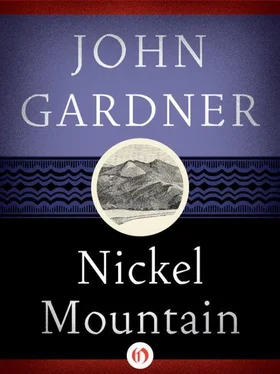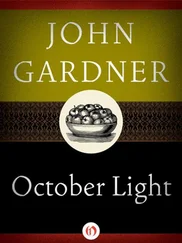The white guard posts curved down and down, on his right, and he could look off and see the whole valley like a painting, the river smooth and silent as mercury, reflecting the trees. This side of the trees there were flat acres of winter wheat and peas and hay and stretches of new-plowed ground. It was like a garden, in the gold light of late afternoon; it was exactly what Paradise ought to be like: a tractor humming along, far below him, small, on the seat a boy with a wide straw hat; to the right of the tractor, red and white cows moving slowly down the lane to a big gray barn with clean white trim. With a little imagination a man could put angels in the sky, the kind in Bible illustrations, and great golden clouds like those. Except of course that eternity wasn’t going to be like that. No tractors, in any case, or trees, or fields. Whatever good you might say of the spirit, you had to give the things of earth their due — silver cords and golden bowls and whatever else it was. He thought all at once of the old country cemetery up on the hillside behind his house, where his father and mother were buried. There’d been a road through there twenty, twenty-five years ago, but they’d moved the highway now and the place was isolated, you couldn’t reach it in a car except by driving down a two-rut lane like a cowpath through overgrown meadow. He would see it sometimes when he went up onto the ridge to hunt, and each time — especially in late afternoon, when the light was queerly charged, the way it was now — it would be as if he were discovering the place for the first time: a natural garden that had been the same for a thousand thousand years. All at once he said to himself, startled, “Why not?” The reasons why not rushed over him like August rain, and he put the thought out of his head and kept it out until he stepped into the long, tiled hall in the basement of the Enloe Memorial Hospital, where the smell of formaldehyde made his stomach turn, and the girl in white and blue beside him — she couldn’t be more than seventeen, no more than a baby — said, “You think this is bad, you should watch them do an autopsy! Glaagh!” He looked at her in alarm. “Have you seen an autopsy?” he said. She shrugged. “Dozens of times. They take this saw—” she drew a line around her forehead from ear to ear “—and they lift off the top of the head like a bottlecap.”
They showed him the body. Henry Soames stood huge and sagging, his skin gray, and stared in disbelief at the woman’s indignity. Her burnt flesh smelled like hoof rot. The doctor or attendant (he couldn’t tell which) at the desk said, “Who’ll be handling the funeral?”
“Wiegerts’ Funeral Home,” he said. The words came out calm and flat, but his heart was racing and the skin of his neck tingled.
“You a relative?” the man asked.
“No, a friend,” Henry said. “But I’m to take charge of it.”
The man got out papers, and Henry thought again of Callie and, worse, of Callie’s mother, and he shut his eyes for a quick, dead serious prayer to whatever might be up there to watch over fools and children.
It wasn’t until he faced his wife, two hours later — he’d stopped at Wiegerts’ before coming home — that he fully realized the magnitude of what he’d done. “Callie,” he said at once, bravely, but his knees went weak underneath him, and he said only, “how is he by now?”
“All right, I guess,” she said. “I really can’t tell.”
She was in the dining room, sewing. Scraps were spread from one end of the room to the other. “He surely is good with Jimmy, I’ll have to hand it to him.” She pressed on the sewing machine pedal, and Henry waited for the noise to finish.
“What do you mean?”
“Oh, you know,” she said, “just the way Jimmy’s taken to him. You never have to wonder where Jimmy is at all. It’s like having a full-time baby-sitter.”
Henry laughed, but hollowly, his heart sinking with the returning thought of the money Callie believed they still had sitting in the bank. He swallowed.
She said, “But I can’t say Mom’s very happy about it.”
He thought with a sudden leap of excitement that he still might stop the check. At least he could have paid on “time.” He was sweating. “Well, good,” he said. He smiled, white.
“Good?” She looked up. “—That Mom’s not happy?”
He was rubbing his sweating hands on the front of his pantlegs. “I meant something else,” he said.
She squinted at him, but after a minute she let it go. She was used to his seeing things in queer ways, and maybe it didn’t seem worth the trouble of straightening out. “Well, anyways—”
At that moment, upstairs in his bedroom, Jimmy screamed. Henry ran for the stairs, off the kitchen, and Jimmy screamed again.
When Henry reached the bedroom door, Jimmy was sitting bolt upright in bed, shaking like a leaf. Henry scooped him up in his arms, and the child clung to him. “Hurt,” he cried, “hurt!”
“What was it?” Callie cried, behind him.
But Jimmy was relaxed now. It couldn’t be that he was sick.
“Nothing,” Henry said, “a dream. It’s all right now, eh, Jimmy?” Henry’s heart was thudding.
Callie leaned close. “What did you dream, Jimmy?”
Already Jimmy was halfway back to sleep.
“You see, it really was nothing,” Henry said softly. “Kids always start having nightmares around his age. He’s over it already.”
Callie kissed Jimmy’s cheek and patted his back, her eyes troubled, and gently Henry laid him in his crib. Callie stood with her hands on the crib rail, looking down. After a long time she turned to look at Henry, her face white and indistinct in the darkness. She said, “Henry, I’m scared.”
“Of what?” he said, exasperated.
“How do I know?” she said. “I’m just scared, that’s all. Really. Aren’t you?”
He looked past her, out the window at the silhouettes of the pines where they rose out of fog. It was still now, as it always was when the fog came in, as if nothing were left alive. The fog hadn’t gotten to the garden yet. The moon was bright, and if there had been rabbits there he would have seen them.
Well, yes, he thought, yes. He tried to think what it was George Loomis had said. It wasn’t here, it was up outside Utica; they’d driven up to the stock car races. He’d mentioned Jimmy, how he’d felt the time Jimmy had had the convulsions, and George Loomis had said — who lived alone, who kept intact his isolation despite all pressures, finally, and would someday die, in his barn, maybe, and not be discovered for two, three weeks—“You take on a responsibility like that, and you say to yourself you’ll move heaven and earth to protect the kid you love, or the woman, or whoever it happens to be, but the minute you say it you’re forgetting something.”
“What’s that?” Henry had said.
George Loomis stared down into the night, leaning forward over the steering wheel, and he said, “You can’t.”
“It’s what drives you to God,” Henry said with a little laugh.
George too had laughed, like a murderer.
That same night, two hours after Jimmy’s cry, Henry sat at his kitchen table, catching up his books. It was long past his bedtime. Normally he was careful to get to bed by ten, doctor’s orders, but he knew it would be no use tonight. By now he felt downright panicky at what he’d done down in Slater. Even without any trimmings whatever, everything plain as plain could be (a thing old Wiegert seemed to find distressing), his bank account would be lighter by six hundred dollars. He couldn’t believe he’d done it, now. Sweat ran down his chest, and the more he tried to think why he’d done it, the wilder it seemed. It would be one thing if he were all alone, no family to think about. He’d often acted on crazy whims before he’d married Callie. Maybe he’d gone un-married too long. It was hard as the devil to change the whole pattern of your life when you got to your forties.
Читать дальше











